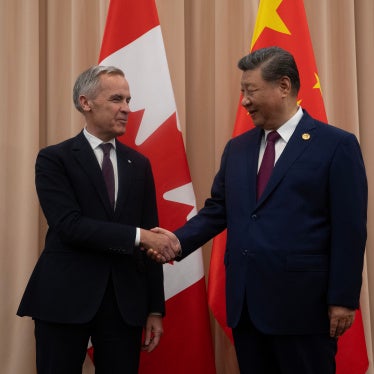(London) – UK Prime Minster David Cameron should publicly call for major reforms to protect human rights when he meets Chinese President Xi Jinping and other officials next week. Cameron will arrive in Beijing on Monday, December 2, 2013, and visit Shanghai and Chengdu during his three-day trip.
“Given the deplorable state of rights in China, Cameron should pick up where he left off earlier this month in Sri Lanka, when he said he would ‘shine a global spotlight’ on abuses,” said Brad Adams, Asia director at Human Rights Watch. “The UK should have a consistent approach to human rights, which must include a forceful public condemnation of rights violations that can be heard by the people of China as well as the government.”
Human Rights Watch’s research has documented an escalating crackdown on human rights activists and government critics over the course of 2013, along with a strengthening of internet censorship, and a deteriorating situation in Tibetan areas and Xinjiang.
The UK government’s own assessment of the human rights situation in China is equally damning. The most recent Foreign & Commonwealth Office annual report on human rights and democracy lists China as a “country of concern” and says:
The use of unlawful and arbitrary measures to target human rights defenders continued during 2012. These included enforced disappearance, house arrest, restrictions on freedom of movement, communication and association, extrajudicial detention (including “re-education through labor” (RTL), “black jails” and involuntary psychiatric committal) and harassment of family members. Human rights defenders also continued to be subjected to criminal charges and procedurally flawed trials, often involving the poorly defined category of offences encompassing “endangering state security”. Diplomats and media were repeatedly refused access to their trials.
The report notes that there were “more such convictions in 2012” and states that: “[J]ournalists, bloggers and intellectuals continue to be harassed or detained for exercising their right to free speech. Many high-profile activists, including Nobel Peace Prize Laureate Liu Xiaobo, are serving long prison sentences for speaking out about political freedom and human rights.”
Prime Minister Cameron should act on these findings and reject the very different stance adopted by his Chancellor, George Osborne, during his visit to China in October. Osborne did not raise human rights in any public setting during his trip and even eschewed the words in his keynote speech to students at Peking University. Instead, he stressed that differences emerge only because the two countries “attach value to different things” and have “different political systems.” Pressed on human rights during an interview with the BBC, he replied that he thought China was “tackling its own problems” in the “way it thinks is appropriate.”
“The abuse of rights by the Chinese government is systematic, egregious and wide-ranging,” said Adams. “Consistent with declared UK policy, David Cameron should press human rights concerns strongly and at the highest levels of the Chinese government to reassure China’s courageous civil society activists that their voices are heard internationally and pressure is being brought to bear on their behalf.”
Human Rights Watch said that Cameron should press the Chinese leadership to implement reforms announced at the recently concluded Third Plenum of the Communist Party of China, the first under the presidency of Xi Jinping. Several measures designed to improve the administration of justice were announced, such as abolishing the re-education through labor system, decreasing the number of crimes warranting the death penalty, curbing the incidence of forced confessions, and strengthening mechanisms to protect courts from improper local interference. The government also announced a minor loosening of its one child policy, by allowing couples where one of the parents is a single child to have a second child.
Left unclear is how these measures will be implemented and whether they will be anything more than inconsistent, piecemeal reforms that leave untouched the government’s policy of systematically suppressing dissent, censoring information, and keeping the Communist Party above the law. For instance, numerous re-education through labor camps appear to be simply changing their name to drug rehabilitation camps and will continue to imprison individuals without trial.
While China may be moving from a “one-child” to a partial “two-child” policy, the announced reform obscures the fact that the entire mechanism of coercive and abusive family planning policies remain in place, including forced sterilizations and abortions.
Pledges to improve the administration of justice and limit the endemic used by the police of confessions obtained under torture will falter if the rights of defense lawyers are not considerably strengthened, such as by allowing the creation of independent bar associations.
Human Rights Watch said that Cameron should press for the release of political prisoners and imprisoned rights activists, including Liu Xiaobo, who is serving an 11-year sentence for “incitement to subvert state power,” and whose wife Liu Xia has been unlawfully imprisoned at her home since October 2010. Liu’s lawyer announced in mid-November that they intended to submit a request for a re-trial.
“It would be inexcusable for a British Prime Minister to visit China and not publicly call for the release of political prisoners, including Liu Xiaobo, a Nobel Peace Prize winner,” Adams said. “Cameron and his predecessors commendably called for the release of Aung San Suu Kyi and others in Burma, and has done the same in many other countries. Chinese activists deserve no less support.”








